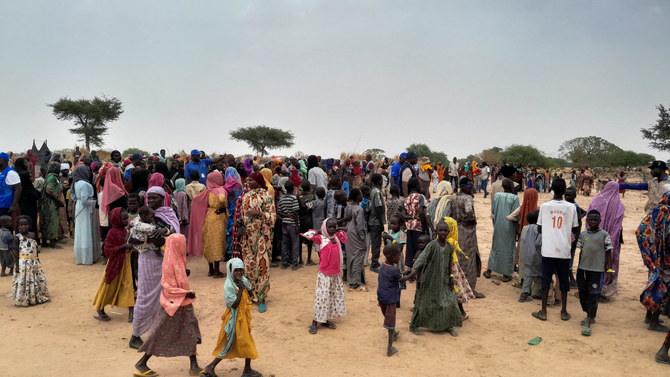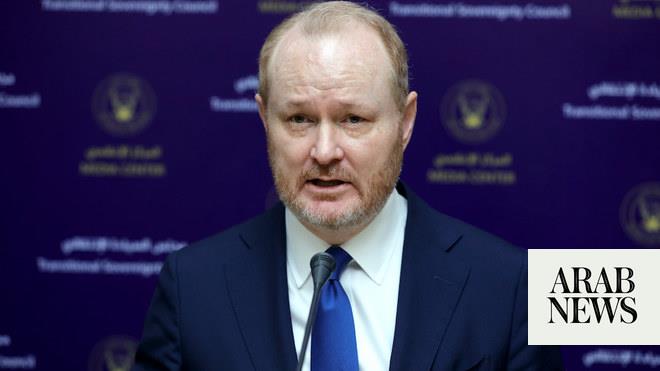
Sudan’s ceasefire is the thread of hope on which the international community is hanging as it seeks to help avert the unthinkable — a civil war in a country that has witnessed 35 coups since its independence, 17 of them successful. This is in addition to two civil wars and conflicts that have led to divisions and battered the country and its economy. The most recent coup in 2021 “weakened domestic activity, slowing down progress toward debt relief,” according to the World Bank. This is at a time when “growth is projected at 0.4 percent in 2023 following five years of recession. Inflation remains in double digits. The population living on less than $2.15 per day is estimated to have risen from 30.6 percent in 2021 to 32.3 percent in 2022.”
This is all on the minds of the neighbors of Sudan and the international community as they look at the fires burning in Khartoum, forcing millions to flee. The last thing Sudan needs is a conflict. But it seems this is not the thinking of the two generals who are fighting it out on the streets: Abdel Fattah Al-Burhan, the head of the Sudanese Armed Forces, and Mohammed Hamdan Dagalo, known as Hemedti, the head of the paramilitary Rapid Support Forces. These two generals, who cooperated and led the coup of October 2021, are in a fight for power until the death.
The US has been blunt in its messaging to the two generals in phone calls made by Secretary of State Antony Blinken. The Assistant Secretary of State for Africa Molly Phee said Blinken “really impressed upon them that nearly the entire world is united in shock at their conduct, and united in their demand to cease this fighting, which is so threatening to the people and to the nation and frankly to the region.”
Washington, which has “temporarily” closed its embassy and evacuated its diplomats, has been in contact with all its allies in the region and with Sudan’s neighbors, which have influence on the two feuding generals, to try to stop the country’s descent into the abyss. The secretary’s message showed that Washington is still hoping for a transition to civilian rule. Phee insisted that the “Sudanese people are not giving up, and neither will we. The goal is to bring an end to this fighting and to start a civilian government.”
Although some doubt that Washington has the influence needed to force this transition to civilian rule, or the wherewithal to stand with the Sudanese people to win this fight, there is great expectation of the US to build a coalition of regional and international partners to put Sudan back on a peaceful, civilian-led path.
After speaking about the “critical role played by our Saudi and Emirati partners,” Phee said the US is exploring how “to contribute our influence and our relationships with partners and allies, particularly in Africa and the Arab world, those that have influence in Sudan, as well as our partners in the international community,” to achieve the goal of ending the fighting and moving to a civilian government.
Critics blame the US and the West for what is happening in Sudan today, accusing them of contributing to Sudan’s collapse. In Foreign Policy magazine, Justin Lynch described Blinken’s talk of the “real opportunity to finally carry forward the civilian-led transition” in Sudan as “US delusions.”
He criticized the US for calling Sudan’s transition “civilian-led,” when “there was nothing about Sudan’s transition that was civilian-led.” Lynch added that the US continued to use the term even after the military delayed the transition to civilian rule. The author said that US officials told him the term was “more aspirational than descriptive.”
Former US officials point to the fact that these two generals were united in their 2021 effort to overthrow the government and prevent the transition to civilian rule. One former official told me they agree that maybe the US “should have come down harder on them” and that there was a legitimate debate in the US government about it. They added that Al-Burhan and Dagalo “were a reality and they were not simply going to vanish because the international community was annoyed by them.”
There is great expectation of the US to build a coalition of regional and international partners to put Sudan back on a peaceful, civilian-led path.
Dr. Amal Mudallali
The administration is now focused on stopping the fighting. The US is talking about moving from a ceasefire to a cessation of hostilities — a confusing distinction, especially as the State Department did not explain the difference between the two.
A statement released by Blinken on Monday pointed out that the US wants to move beyond the ceasefire commitments and achieve “a durable end to the fighting.” He said the US will “coordinate with regional and international partners, and civilian Sudanese stakeholders, to assist in the creation of a committee to oversee the negotiation, conclusion, and implementation of a permanent cessation of hostilities.”
The American priority was to use all the leverage it had with its allies to stop the fighting. Its efforts led to the “shaky” 72-hour ceasefire that it hopes will expand and last.
Former US Special Envoy for the Horn of Africa Jeff Feltman told me he agrees with the US administration that the immediate task is to have this ceasefire hold for two reasons. First, he said, it is important because there are 46 million people who have effectively been taken hostage and there is a need to give them their humanitarian needs, like food, water and safety.
Second, he said, “you saw this in Syria, in Libya and elsewhere. If the fighting continues … it will be tempting for outside actors to get involved to support one general against the other,” and this will “hypercharge” the fighting. “So you need to get a ceasefire to ease the civilian situation … and to prevent a local fight from becoming a regional proxy fight,” he added.
If there is any consensus on Sudan it is that everyone agrees that the country’s stability is essential. Feltman said no one in the region or in the wider international community wants to see Sudan destabilized.
But the question is what is the end game? What comes after the ceasefire? How will a peace process be started? Feltman pointed to the current divisions within the security services and noted that, “relatively speaking, the civilians will be in a stronger position than they were in before, when the security services were united. But we are left with the dilemma of what to do with one or two generals, neither of whom can be trusted with a democratic civilian transition. I do not know what the answer is.”
But he said that it is now “abundantly clear” that “neither of these generals can be trusted. They have broken commitments to the international community, they have broken commitments to each other and, most importantly, they have broken commitments to the Sudanese civilians. It is out of the question we should trust these guys.”
Feltman said the “challenge for us is how to take our collective shared interest in a stable Sudan, and there is a unity behind a stable Sudan, and translate that shared interest into supporting a political process that achieves for the Sudanese people what they want to achieve, which is a democratic future.”
No one knows which general will win this fight, if there is to be a winner. But the problem for the Sudanese civilians is that, if the international community commits the same mistake and forces them to sit down with the same generals (or general) to discuss a peaceful transition to a civilian, democratic Sudan, it will be the definition of insanity.
• Dr. Amal Mudallali is an American policy and international relations analyst.












